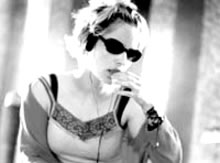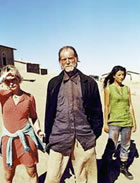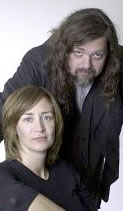
Do you think that people watching these films are more hung up on the Dogme rules than the four of you are?
I hope that people don't sit and look at the film and just thing, 'Rule, rule, rule ...' I hope that people get emotionally involved. Because when it's just about rules, it's very boring. There's this French writer who wrote a book, I think it's called Henri Bouillard(?), where he sets some rules on how to write. He said he should start writing in the morning, for an hour or so, and then he should write for another two or three hours about himself. And the important thing was never to read what he had written or to re-write anything. He writes about himself and it's very, very moving. It's horrible when he writes about his face and looking into the mirror. It's very, very good. But I never thought about the rules he made for himself when I read that. If I did it wouldn't be moving. I think what's very confusing about Dogme, and I'm not sure if it's alright, is that it's almost become just about rules, but actually the rules are there just for the director. It's a tool for the director. But it's become more of a marketing thing and I know that the four of us are responsible for that. But I also think we did something wrong. I think had we known when the rules were made that it was going to get so big in the way it did - we never imagined that it was going to be like this - I think if we had, we would have made it differently.
The real problem is that when you make a film, you like people to go and see it. But the whole idea of making something is for people to see it, so you becoming a little bit of a slave to that whole marketing process. And something in the middle of that got into Dogme, I think. I agree with all the people that criticise Dogme for being a marketing device. It wasn't meant to be that but it became that, and it's really wrong. I think that's why it's very hard for us to keep that kind of interest in it.
Do you think that it has been taken away from you and lost its purity?
Yeah it did, I think. Because it was just the four of us talking and it was very fun then.
It's like all revolutions ...
It's not a revolution. I don't think any of us think Dogme is a revolution. I think there was a revolution at the end of the Fifties and it was called the New Wave. And that had huge impact here in England and France, and it had huge impact in the Seventies in America. I think Dogme is just a little reminder of that.
What has the impact of Dogme been? Could a film such as The Blair Witch Project been made without Dogme, do you think?
I don't think the Blair Witch people knew about Dogme when they did it. I don't know. I think there is, and there still is, some kind of saturation of a specific way of making films that producers and studios push because they think that is the way to do it. But I think among audiences and filmmakers there is, in India, China, Denmark, all over, a need to do things in a different way. Dogme was one of the ways. It has to be like that, just a general feeling. If you take just the way you use music in films, when something is scary, you have to have a certain kind of violin deep tone that makes you afraid. And when something is supposed to make you cry, you have to have a certain kind of violin music. I think people are getting fed up with being told what to feel, and I think there is a reaction. Blair Witch is one kind of reaction to that, and Dogme is another.
Talking about music, I found the silence of the aerial shots very eerie and one of things that left them open to interpretation.
That comes from the rules. You can't put sound on them. We had to use a mute because if you had sound you would hear the helicopter and that would be wrong. It would give the impression that there was a helicopter there. Which there was. I like that silence, it makes them interesting.
I think it leaves you thinking what this thing is that is pursuing them. Is it the Angel of Death or whatever. To me these people invoke something destructive from their subconscious via their re-enactment of the play.
This film is not a film with a plot. It's not a film where the director takes your hand and guides you. I like the fact that people find their own thing in the film. It's made like that. It's nice sometimes when you watch a film and you can make your own interpretation. It's when you read a book and you can read it one way when you're 20 and another way when you're 30. I think that's nice.
 Lars said that there has been a change from Catholicism to Protestantism in the group in as much as you have all realised that you are sinners because you cannot keep to all the rules. Do you agree with that? And, that being the case, have the rules now become guidelines rather than rules? Or were they always just guidelines. And does that in effect mean that Dogme is no longer Dogme?
Lars said that there has been a change from Catholicism to Protestantism in the group in as much as you have all realised that you are sinners because you cannot keep to all the rules. Do you agree with that? And, that being the case, have the rules now become guidelines rather than rules? Or were they always just guidelines. And does that in effect mean that Dogme is no longer Dogme?
[long pause] I think every rule is like the Ten Commandments. You can interpret it like Catholics and Protestants. I think the truth is in a grey area between guidelines and rules. If you are Catholic you can do your best to be a good Catholic, but no one is a real good Catholic in their life, you know? Perhaps they are, but there's so much fornication going on in the Italian Churches. So you can do your absolute best. And it's the same with Dogme. You have to push yourself as much as you can into it but I agree, there will never be a completely Dogme film. That's not possible. It gives some kind of energy. You can say 'my film is a registration of these characters'. Because of Dogme I couldn't do the things one would do normally - such as camera tracking - that would emphasise the feelings. Some people could argue that that's not filmmaking, and it's true, but it's a kind of filmmaking. I think when you do a Dogme that's the way it is but there are so many films made in the way where you kind of choreograph and guide your audience, so I felt this was an interesting way of trying to do something else.
There is a new digital camera that has been enhanced by Panavision to give 24 fps and therefore bring it closer to the quality of film. Given that advance will you stick with digital?
I would. I don't think I would stick to digital for every film but I do think making video look like film is fundamentally wrong, because it's absurd. It's like when you had the first synthesisers and you wanted to make them sound like a piano. It's not very interesting. Why not use a piano? What's interesting with these machines is sampling and making it work on its own. The camera was invented in 1880, I think. Why is that date specifically interesting for our aesthetic sense? I was very much a celluloid person before doing my film. But what I realised is that it is very banal. An image is just an image - it doesn't matter if it was shot on a Polaroid, video, celluloid or whatever - a picture is a picture.
What is your next project?
I am writing a project which is not a Dogme film but where I use some of the things that it gave me. It's very hard to talk about a film when you're in it, or when you're writing it. Some people can do that but I can't, because still very virgin territory. It's also set in Africa but it's very different from The King is Alive. Of course, they're both stories from my head so there are some similarities, but it's not set in the present, it's set in the past.
What attracts you to Africa?
I've been to Africa a lot and when you get it, you can't really get rid of it. I think there are some things that I tried to explore a little bit in The King is Alive. It's an interesting mirror to our civilisation because it's so different; that's where we come from. I think that's what's so brilliant, for instance, in Heart of Darkness, when he describes these people travelling up the river and he says that's what the Romans did. 2000 years ago they went up the Thames and they saw barbarism, the wildness on the shores, and then he makes this book about somebody going up the Congo River. That whole thing interests me a lot.
Conrad's novella and your film both tap into this idea that beneath this veneer of civilisation there is this barbarity.
Heart of Darkness, I've read that book so many times and every time I read it, there's something new in it. I think Africa is really a wonderful place to explore these things. It's just like storytelling. A man telling a story. In Morocco I found it so beautiful that on the big squares you have storytellers, and they all tell the same stories because they're from the Koran. You have real good storytellers who would have like 200 people around him, and then you'd have a less good one and there'd be like 30 people, and then you would have like the very bad one and they'd be like a little child in front of him. That whole tradition of telling stories is really wonderful, that's what we try to do.
Dogme seems to me to be returning that, stripping things bare to the bones of a story and characters and emotion.
At the end of the day, that's what we wanted to try with Dogme. But it's about one more thing - and it's what I really like about Dogme. If you ask a man, if I ask you, 'Would you direct a film?' you would say, 'No, no, no, I wouldn't. It's too difficult. It's too technical. I wouldn't know how to do that'. But that's complete bullshit. In its own little way, Dogme has proved that. Because people think that directing a film is knowing that a flicker-free HMI isn't a problem when you're shooting slow-mo. Well that is not what filmmaking is about. Filmmaking is about telling a story, if you have a story to tell. The two most difficult things, I think, for every filmmaker or every writer are, 'Have I got something that's worthwhile telling and how do I tell it'. That's the real problem of filmmaking."
And this, more than anything, tests a filmmaker's ability to tell a story, because you're not going to be saved by special effects.
Yeah. I think, it's not by comparison, but I think Proust once wrote something about literature, and he said, 'It's only about content. The formalists never stay'. Joseph Conrad tells such a strong story about something that's in his head, and you feel that in every second. You can disagree with things or whatever, but you feel it because it's so strongly in him. I'm not saying that's what I'm doing, it would be pretentious to say that I am because I wouldn't be able to, but I think that is what one should aim for. You should aim for telling a story that can mean something to people.
Yes, and I think the story must be told with passion and conviction.
Yes, it's like what you said about the actors, because there's no big difference in that way. An actor is somebody that has something to tell, and they have to bring it up from very, very deep. It's when you look into that depth that you feel touched by it and moved by it. When they allow you that, when they open themselves up to you, as an audience, that's when I love films.
This cast you've assembled is very eclectic. How did you know these people would have that ability to open themselves up in the way that they do?
I don't know, you just feel that. First of all, when you have that kind of script and you don't have much money, people really want to take the parts. Many actors wouldn't want to do that and many of those actors would be ones that want to work in a more traditional way. So there's already a good, big chunk of actors not in there. Secondly I think it's very obvious when you see the actors and see their work, talk to them and all that, you can feel it very strongly when they're ready to do that. There must be a real hunger to act, just as there must be a hunger to direct. In some actors and some directors the hunger has disappeared, and it's just about reproducing. I'm not going to mention any names but you see that in some wonderful actors and it's very sad. It can happen to all of us, journalists, actors, whoever. The hunger disappears. When you read Truffaut's writing in Cahiers du Cinema, there's such a strong hunger. Sometimes I completely disagree with what he's saying because he was a very, very hard critic of people, but there was such a strong hunger. Sometimes I think it is the same thing with actors; there's a strong hunger to perform, to do this part. I think a director's job and talent is to see that and say, Here's a real hunger. They're not doing it just for this or for that. I can say that all the people in my film, they had a strong hunger for the part.
I think the nakedness of the emotions in the film are sometimes quite hard to watch.
And you found that made it hard to watch?
 At times.
At times.
That's what's difficult when you've made a film. I can't see that.
I don't think it's gratuitous, I just think that it's unusual to see emotions this raw and that's what I like about it, because have dared to go to those lengths.
Yeah, and I love them for it. When you've finished a scene you feel that you owe them so much. But on the other hand what I think they feel is that you also have to put in yourself, so there's a real interesting dialogue without words going on between them opening themselves up and one doing it. You know, there's some scenes in this film which, when I watch them, I think, 'Shit, who wrote this? He must be so sick in his head. He needs consultation tomorrow'. Really.
What scene particularly makes you feel like this? I could think of one or two.
The pissing scene. I feel very embarrassed when I watch that. When we wrote that scene, I couldn't even say that to Anders Thomas who I wrote it with, you know? It all of a sudden came up - we were linked together on our computers - and I said, 'Read this' because I couldn't say it. He said, 'Oh no, we can't do that'. All of a sudden he just did it.
Were all the people in the cast your first choice?
It doesn't really work like that. When we went there I felt that I had the cast, but we talked to other people in the process and some of them weren't free. It's like if you take the case of Jennifer. I didn't send the script to her, she got it through her agent and she called me and she said she wanted to be in the film. I slightly had to modify the part but I respected her so much and she was somebody I really, really liked as an actress. I also felt that she had that capacity.
I felt that in this film she was a lot more human than in a lot of her other roles. Often you can feel that she is playing a part.
Actually, we made a little rule for that which we talked about before. Jennifer is usually somebody that is good at take 10 - this is something that she said to me herself - and we were only two takes or three takes co she could not control it so much. What's amazing about Jennifer is that she was only good in the first two or three takes. She said, 'I've never been like this. Directors have always said to me I'm only good at the end, and now I can feel it the first two or three takes'. That was really good. She was absolutely wonderful to work with."